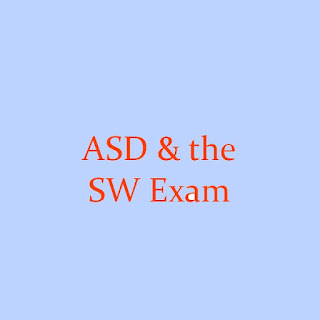Here's another in our series of quizzes designed to help you get prepped for the social work licensing exam. Here, we've listed several entries from Wikipedia's long list of psychotherapies and the descriptions linked there.Your job: Name that psychotherapy!
Good luck. Answers are in comments.
1.__________________ is a philosophical method of therapy that operates on the belief that inner conflict within a person is due to that individual's confrontation with the givens of existence.
2.__________________ is an existential/experiential form of psychotherapy that emphasizes personal responsibility, and that focuses upon the individual's experience in the present moment, the therapist-client relationship, the environmental and social contexts of a person's life, and the self-regulating adjustments people make as a result of their overall situation.
3.__________________ is a structured, short-term, present-oriented psychotherapy for depression, directed toward solving current problems and modifying dysfunctional thinking and behavior.[
4.__________________ is a goal-directed collaborative approach to psychotherapeutic change that is conducted through direct observation of clients' responses to a series of precisely constructed questions. [This therapy] focuses on addressing what clients want to achieve exploring the history and provenance of problem(s).
5.__________________ (known by several names) provides clients with an opportunity to develop a sense of self where they can realize how their attitudes, feelings and behavior are being negatively affected. [This therapy] maintains that there are several necessary and sufficient conditions required for therapeutic change. Among these are therapist genuineness, unconditional positive regard, and empathic understanding
How'd you do? Answers in comments. Stay tuned for more exam-prep friendly quizzes. Good luck on the exam!
Good luck. Answers are in comments.
1.__________________ is a philosophical method of therapy that operates on the belief that inner conflict within a person is due to that individual's confrontation with the givens of existence.
2.__________________ is an existential/experiential form of psychotherapy that emphasizes personal responsibility, and that focuses upon the individual's experience in the present moment, the therapist-client relationship, the environmental and social contexts of a person's life, and the self-regulating adjustments people make as a result of their overall situation.
3.__________________ is a structured, short-term, present-oriented psychotherapy for depression, directed toward solving current problems and modifying dysfunctional thinking and behavior.[
4.__________________ is a goal-directed collaborative approach to psychotherapeutic change that is conducted through direct observation of clients' responses to a series of precisely constructed questions. [This therapy] focuses on addressing what clients want to achieve exploring the history and provenance of problem(s).
5.__________________ (known by several names) provides clients with an opportunity to develop a sense of self where they can realize how their attitudes, feelings and behavior are being negatively affected. [This therapy] maintains that there are several necessary and sufficient conditions required for therapeutic change. Among these are therapist genuineness, unconditional positive regard, and empathic understanding
How'd you do? Answers in comments. Stay tuned for more exam-prep friendly quizzes. Good luck on the exam!















